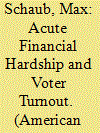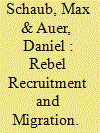| Srl | Item |
| 1 |
ID:
181560


|
|
|
|
|
| Summary/Abstract |
How does poverty influence political participation? This question has interested political scientists since the early days of the discipline, but providing a definitive answer has proved difficult. This article focuses on one central aspect of poverty—the experience of acute financial hardship, lasting a few days at a time. Drawing on classic models of political engagement and novel theoretical insights, I argue that by inducing stress, social isolation, and feelings of alienation, acute financial hardship has immediate negative effects on political participation. Inference relies on a natural experiment afforded by the sequence of bank working days that causes short-term financial difficulties for the poor. Using data from three million individuals, personal interviews, and 1,100 elections in Germany, I demonstrate that acute financial hardship reduces both turnout intentions and actual turnout. The results imply that the financial status of the poor on election day can have important consequences for their political representation.
|
|
|
|
|
|
|
|
|
|
|
|
|
|
|
|
| 2 |
ID:
193106


|
|
|
|
|
| Summary/Abstract |
We investigate whether the threat of recruitment by rebel groups spurs domestic and international migration. The existing literature on wartime displacement has largely focused on potential victims of violence. We argue that alongside potential victims, we should expect to see the out-migration of individuals who are attractive to the rebels as potential recruits. To test this hypothesis, we draw on original survey data collected in the context of the MFDC insurgency in southern Senegal. Causal identification stems from instrumenting recruitment threat with the density of the local forest canopy cover. Analyzing data from 3,200 respondents and over 24,000 family members, we show that individuals who fit the recruitment profiles of rebel groups are more likely to leave and be sent away by their families. Our paper contributes micro-evidence for a mechanism linking violent conflict to migration, which so far has received scant attention, and provides a deeper understanding of the composition of refugee flows.
|
|
|
|
|
|
|
|
|
|
|
|
|
|
|
|